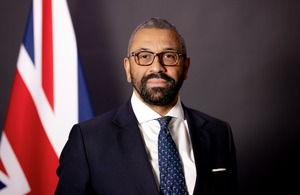Home Secretary to outline migration vision during US visit
Home Secretary to call on the global community to take collective action on migration in speech in New York.

Photograph of Home Secretary James Cleverly
The Home Secretary will lead an international push to tackle issues around global migration in a major speech tomorrow.
James Cleverly will set out his ambition for a new global response to tackle mass migration during a two-day visit to America.
At a speech in New York on Tuesday, the Home Secretary will outline how this global issue can only be met with global action to reform migration policy, and urge the international community to unite in facing this challenge.
The UK is already delivering on the Prime Minister’s plan to stop the boats, with the number of illegal migrants arriving in the UK down by 36% last year compared to 2022. This has been achieved in part thanks to international cooperation, including unprecedented work with France and a returns deal with Albania which has seen Albanian arrivals go down by more than 90%. The Home Secretary will use his speech to call for more international cooperation in this vein.
He will say:
Today I am calling for a big, open, global conversation about what more we need to do together and what needs to change.
The UK will show the same sort of leadership on this as we have with climate change, conflict prevention, and artificial intelligence. Success is dependent on a holistic, whole of route approach.
While remaining welcoming and generous, we must also urgently consider the impact that this level of migration has not just on those countries where migrants seek to settle, or through which they transit, but also on the countries they leave behind, and indeed on the migrants themselves. We need to do more, together.
He will challenge the international community to take collective action to:
- smash the people-smuggling gangs
- address all the drivers of forced displacement
- help people to thrive in their own countries
- encourage developed countries to invest in international development
- support countries who wish to settle more refugees
- tackle irregular migration upstream
- consider how we need to update the international architecture around these issues
- increase international trade
- find, together, the right balance of economic and cultural growth and control
He will highlight how the UK is leading the way with its migration policy:
Our Migration and Economic Development Partnership with Rwanda is an innovative way of dealing with illegal immigration. It acts as a deterrent, by making clear that anyone who comes to the UK illegally cannot expect to stay. But it will also provide illegal UK immigrants with an alternative home. It is called a Migration and Economic Development Partnership for good reason, as we are making a major investment in Rwanda.
We are working closely with France to stop illegal Channel crossings, to good effect. And I have just signed a deal with Frontex, the European Borders and Coast Guard Agency, to exchange information and intelligence and take on the people-smuggling gangs together…
The UK has also secured close co-operation on migration with a range of countries, including India, Vietnam, and Albania, and signed returns agreements with countries such as Serbia, and Georgia.
He will also emphasise the importance of recognising the impact on countries where people emigrate in large numbers from:
A talent drain can have a devastating effect, causing a flight of capital, huge gaps in the workforce, and security issues. It can be extremely expensive for countries to train professionals who then take their skills elsewhere. Furthermore, citizens will suffer if their country fails to invest in skills and training and then plugs those gaps with immigration… doing the right thing by someone in need doesn’t necessarily mean relocating them to our own country. Central to solving the international migration challenge is doing more, collectively, to help people to stay and thrive at home.
This speech comes at the end of the Home Secretary’s visit to the US. Ahead of the speech, James Cleverly spoke to leading tech companies in San Francisco to address critical threats from emerging technologies to public safety and global democracy.
He spoke about the need for more collaboration with organisations including Apple, Meta, Google and YouTube to find solutions to tackle tech-enabled harms and commit to safety-by-design to protect children.
He also took part in an event with Reid Hoffman, co-founder of LinkedIn, bringing industry leaders together to discuss how tech firms and governments can join forces to better protect users and prevent the exploitation of children on their platforms.